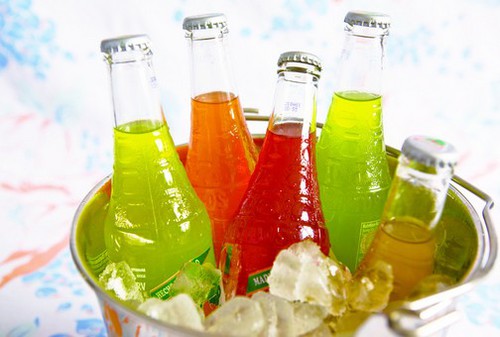- 用心翻譯每一天

聯(lián)系我們
全國統(tǒng)一服務熱線:
電話:021-58446796
公司QQ:732319580
郵箱:daisy.xu@easytranslation.com.cn
網(wǎng)址:www.jpgfs2012.com
地址:上海浦東金橋開發(fā)區(qū)金豫路700號6號樓1樓
Possible link between sugary drinks and cancer 含糖飲料與癌癥之間可能存在聯(lián)系 上海譯銳翻譯 2019-7-12 16:23 P.M. A study published by The BMJ today reports a possible association between higher consumption of sugary drinks and and an increased risk of cancer. 今日發(fā)表于BMJ(《英國醫(yī)學雜志》)的一篇研究報告表明,攝入更多的含糖飲料可能和癌癥風險增加之間存在聯(lián)系。 While cautious interpretation is needed, the findings add to a growing body of evidence indicating that limiting sugary drink consumption, together with taxation and marketing restrictions, might contribute to a reduction in cancer cases. 盡管仍需要慎重解釋,研究結(jié)果和不斷擴大的證據(jù)數(shù)量表明,限制攝入含糖飲料、采取征稅政策以及進行營銷限制可能會減少癌癥病例。 The consumption of sugary drinks has increased worldwide during the last few decades and is convincingly associated with the risk of obesity, which in turn is recognized as a strong risk factor for many cancers. But research on sugary drinks and the risk of cancer is still limited. So a team of researchers based in France set out to assess the associations between the consumption of sugary drinks (sugar sweetened beverages and 100% fruit juices), artificially sweetened (diet) beverages, and risk of overall cancer, as well as breast, prostate, and bowel (colorectal) cancers. 在過去的幾十年來,在全球范圍內(nèi),含糖飲料的攝入不斷正價并且顯然和肥胖風險相連。而這反過來被認為是多種癌癥的強烈風險因素。但是有關(guān)含糖醫(yī)療和患癌風險的研究卻仍然有限。因此,法國的研究團隊決定評估含糖飲料(利用糖來實現(xiàn)甜味口感的飲料和100%果汁)、人工增甜的(飲食)和飲料與總體癌癥風險以及乳腺癌、前列腺癌以及大腸直腸癌之間的關(guān)聯(lián)。 Their findings are based on 101,257 healthy French adults (21% men; 79% women) with an average age of 42 years at inclusion time from the NutriNet-Santé cohort study. 他們的研究結(jié)果來自于NutriNet-Santé 群組研究中平均年齡在42歲的101,257位健康的法國成年人(21%為男性;79%為女性)。 Participants completed at least two 24-hour online validated dietary questionnaires, designed to measure usual intake of 3,300 different food and beverage items and were followed up for a maximum of 9 years (2009-2018). 參與者至少完成2項驗證性的24小時在線飲食調(diào)查問卷。該問卷旨在測定3,300種食品和飲料常規(guī)的攝入量并隨后在長達9年的時間(2009-2018)里對受試人群進行跟進。 Daily consumption of sugary drinks (sugar sweetened beverages and 100% fruit juices) and artificially sweetened (diet) beverages were calculated and first cases of cancer reported by participants were validated by medical records and linked with health insurance national databases. 研究計算了含糖飲料(用糖獲得甜味的飲料和100%果汁)以及人工增甜(飲食)飲料的日常飲用量。由參與者所報告的第一批癌癥病例已經(jīng)過病例報告的驗證并與健康保險國家數(shù)據(jù)庫相聯(lián)系。 Several well known risk factors for cancer, such as age, sex, educational level, family history of cancer, smoking status and physical activity levels, were taken into account. 若干個眾所周知的致癌風險因素,比如年齡、性別、教育水平、癌癥家族史、吸煙史以及鍛煉程度也在考慮范圍之內(nèi)。 Average daily consumption of sugary drinks was greater in men than in women (90.3 mL v 74.6 mL, respectively). During follow-up 2,193 first cases of cancer were diagnosed and validated (693 breast cancers, 291 prostate cancers, and 166 colorectal cancers). Average age at cancer diagnosis was 59 years. 男性平均每日含糖飲料的攝入量要大于女性(分別為90.3mL和74.6mL)。在跟進過程中,首批2,193例癌癥被診斷并被驗證(乳腺癌693例、前列腺癌291例,大腸直腸癌166例)。受試者被診斷為癌癥的平均年齡為59歲。 The results show that a 100 mL per day increase in the consumption of sugary drinks was associated with an 18% increased risk of overall cancer and a 22% increased risk of breast cancer. When the group of sugary drinks was split into fruit juices and other sugary drinks, the consumption of both beverage types was associated with a higher risk of overall cancer. No association was found for prostate and colorectal cancers, but numbers of cases were more limited for these cancer locations. 結(jié)果表明,每年多喝100mL含糖飲料,患有一般癌癥的風險就是增加18%,而患乳腺癌的風險就會增加22%。當一組含糖飲料被分為果汁和其他類含糖飲料時,兩種類型的飲料攝入量與一般癌癥患病風險增高有關(guān)。含糖飲料與前列腺和大腸直腸癌之間的聯(lián)系還未發(fā)現(xiàn),但是大多數(shù)癌癥病例都集中于這些部位。 Prostate:['prɑ.ste?t]前列腺 Colorectal:[?ko?l?'rekt?l]大腸直腸 In contrast, the consumption of artificially sweetened (diet) beverages was not associated with a risk of cancer, but the authors warn that caution is needed in interpreting this finding owing to a relatively low consumption level in this sample. 與之相反,人工增甜(飲食)飲料的深入與患癌風險沒有相關(guān)性。但是,作者警告稱,在解釋這一結(jié)果時,需采取審慎的態(tài)度,這主要是因為人工增甜(飲食)飲料的攝入量相對較低。 Possible explanations for these results include the effect of the sugar contained in sugary drinks on visceral fat (stored around vital organs such as the liver and pancreas), blood sugar levels, and inflammatory markers, all of which are linked to increased cancer risk. 針對這些結(jié)果可能存在以下解釋,具體包括含糖飲料中的糖分對內(nèi)臟脂肪(存儲于重要器官,比如肝臟和胰腺周邊)、血糖值以及炎癥標志物的影響。這三種都與不斷增加的患癌風險相關(guān)。 visceral fat:內(nèi)臟脂肪 Pancreas:['p??kri?s]胰腺 Other chemical compounds, such as additives in some sodas might also play a role, they add. This is an observational study, so can't establish cause, and the authors say they cannot rule out some misclassification of beverages or guarantee detection of every new cancer case. 其他化學合成物,比如某些蘇打水中的添加劑可能也發(fā)揮了重要的作用,研究者補充表示。這是一項觀察性的研究,因此無法明確原因。作者表示,他們無法排除某些飲料被錯誤分類或保證發(fā)現(xiàn)每一個新的癌癥病例。 rule out: 不考慮; 排除 Nevertheless, the study sample was large and they were able to adjust for a wide range of potentially influential factors. What's more, the results were largely unchanged after further testing, suggesting that the findings withstand scrutiny. 然而, 研究的抽查對象眾多,研究者們能夠針對種類廣泛的潛在影響因子進行調(diào)整。更重要的是,在進一步測試后,研究結(jié)果基本沒有變化,這表明,研究結(jié)果接受住了仔細檢驗。 These results need replication in other large scale studies, say the authors. 作者表示,這些結(jié)果需要在其他大規(guī)模的研究中進行復制。 "These data support the relevance of existing nutritional recommendations to limit sugary drink consumption, including 100% fruit juice, as well as policy actions, such as taxation and marketing restrictions targeting sugary drinks, which might potentially contribute to the reduction of cancer incidence," they conclude. 他們的結(jié)論是:“這些數(shù)據(jù)證實,現(xiàn)存的、限制含糖飲料攝入(包括100%果汁)的營養(yǎng)建議以及政策行動,比如針對含糖飲料進行征稅和設定營銷限制具有關(guān)聯(lián)性,而這可能潛在地有助于減少癌癥的發(fā)生率。” Incidence:(尤指罪行、疾病等的)發(fā)生率 Contribute to:有助于 文章來源:科學日報 編輯:Susan